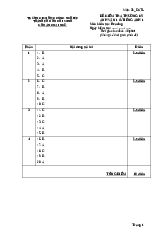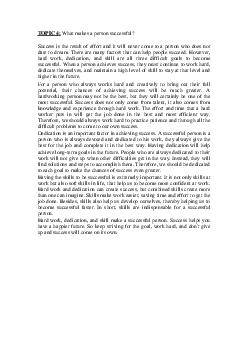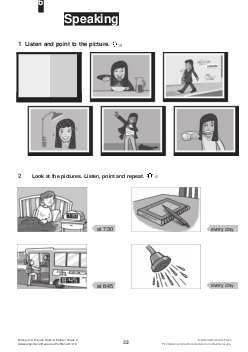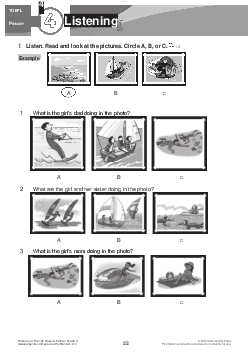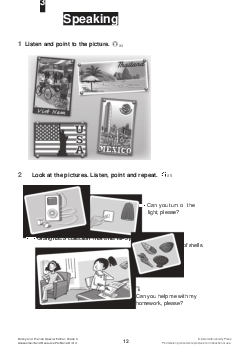





Preview text:
FINAL SPEAKING ( Unit 1-6 ) Unit 1 : Lifestyle a. How well do you sleep ?
Linh: “Hey Long, I’ve been having trouble sleeping lately. Do you have any tips?”
Long: “Yeah, I’ve been there. One thing that helps me is to establish a consistent
sleep schedule. Try to go to bed and wake up at the same time every day, even on weekends.”
Linh: “That’s a good idea. What else?”
Long: “Another thing that works for me is to avoid caffeine and alcohol before
bedtime. They can interfere with your sleep quality.”
Linh: “Interesting. I’ll keep that in mind. Anything else?”
Long: “Yeah, try to create a relaxing bedtime routine. Maybe take a warm bath or
read a book before going to bed. It can help you unwind and prepare for sleep.”
Linh: “Thanks for the tips, Long. I’ll give them a try tonight.”
I hope this helps! Let me know if you have any other questions. b. The secrets of a long life
Linh: “Hey Long, do you know any secrets to living to be one hundred?”
Long: “Well, there’s no magic formula, but there are some things you can do
to increase your chances. For example, eating a healthy diet, staying active,
and managing stress can all help.”
Linh: “That makes sense. What else?”
Long: “Another thing that’s important is to stay connected with others. Having
strong social ties can help you live longer and healthier.”
Linh: “Interesting. What about genetics? Don’t they play a role?”
Long: “They do, but only to a certain extent. Studies have shown that lifestyle factors
are much more important than genetics when it comes to longevity.”
Linh: “I see. Thanks for the tips, Long. I’ll try to incorporate them into my own life.” c. A lifestyle
Linh: “Hey Long, how do you maintain a healthy lifestyle?” lOMoAR cPSD| 40799667
Long: “Well, I try to eat a balanced diet and exercise regularly. I also make sure to
get enough sleep and manage my stress levels.”
Linh: “That’s great. What kind of exercise do you do?”
Long: “I like to mix it up. Sometimes I go for a run, other times I do yoga or
lift weights. It keeps things interesting.”
Linh: “I see. What about your diet?”
Long: “I try to eat plenty of fruits, vegetables, and whole grains. I also limit my
intake of processed foods and sugary drinks.”
Linh: “That sounds like a good plan. Do you have any other tips?”
Long: “One thing that’s helped me is to stay hydrated throughout the day. I carry
a water bottle with me everywhere I go.”
Linh: “Thanks for the advice, Long. I’ll try to incorporate some of those habits into my own lifestyle.” d. Nature and health
Linh: “Hey Long, what do you think about nature?”
Long: “I think nature is amazing. It’s good for our physical and mental health.”
Linh: “I agree. What are some ways we can enjoy nature?”
Long: “Well, we could go for a hike, have a picnic in the park, or just take a walk outside.”
Linh: “That sounds nice. What are some benefits of spending time in nature?”
Long: “Studies have shown that spending
time in nature can reduce stress, improve mood, and boost creativity 1.”
Linh: “Wow, I didn’t know that. What else?”
Long: “Nature can also help us feel more connected to the world around us and
give us a sense of purpose 1.”
Linh: “That’s really interesting. I’ll have to spend more time outside.”
Long: “Definitely. It’s good for the soul.” e. A local park
Linh: “Hey Long, have you been to the local park lately?” lOMoAR cPSD| 40799667
Long: “Yeah, I was there last weekend. It’s a great place to relax and enjoy nature.”
Linh: “What kind of activities can you do there?”
Long: “There are plenty of things to do. You can go for a walk, have a picnic,
play sports, or just sit and read a book.”
Linh: “That sounds nice. What’s your favorite thing to do there?”
Long: “I like to play frisbee with my friends. It’s a fun way to get some exercise and enjoy the outdoors.”
Linh: “I’ve never played frisbee before. Do you think you could teach me?”
Long: “Sure, I’d be happy to show you. It’s easy to learn.”
Linh: “Thanks, Long. I’m looking forward to it.” Unit 2 : Competitions
a. Making rules for news competitions
Linh: “Hey Long, do you have any ideas for making rules for news competitions?”
Long: “Well, one thing that’s important is to make sure the rules are clear and easy to
understand. That way, everyone knows what’s expected of them.”
Linh: “That makes sense. What else?”
Long: “Another thing to consider is the judging criteria. You want to make sure the
judges are evaluating the entries based on the same standards.”
Linh: “Good point. What about the prizes? How do you decide what to offer?”
Long: “It depends on the competition, but you want to make sure the prizes are
attractive enough to encourage people to participate. Maybe offer a cash prize or a
chance to be published in a prestigious publication.”
Linh: “Interesting. What about the deadline? How long should people have to submit their entries?”
Long: “Again, it depends on the competition, but you want to give people enough
time to create something great. Maybe a month or two.”
Linh: “Thanks for the tips, Long. I’ll keep them in mind when I’m making the rules for my next competition.”
b. Is competition important in sport ?
Linh: “Hey Long, do you think competition is important in sports?” lOMoAR cPSD| 40799667
Long: “Absolutely. Competition can motivate athletes to perform better and push
themselves to their limits.”
Linh: “That makes sense. What are some other benefits of competition?”
Long: “Well, it can also help athletes develop important life skills like teamwork,
sportsmanship, and perseverance.”
Linh: “Interesting. What about the downside of competition? Can it be harmful?”
Long: “It can be if it’s taken too far. Athletes need to learn how to compete in a
healthy way and not let it consume them.”
Linh: “I see. So, competition can be both good and bad depending on how it’s approached.”
Long: “Exactly. It’s all about finding the right balance.” Unit 3 : Transport a. Transport solutions
Linh: “Hey Long, have you heard about any new transport solutions lately?”
Long: “Yes, there are a lot of exciting developments happening in the world of
transportation. For example, some cities are experimenting with electric buses and
trains to reduce emissions and improve air quality.”
Linh: “That’s really cool. What else?”
Long: “Another idea that’s gaining popularity is bike-sharing. This allows people to
rent bikes for short trips around the city, which can help reduce traffic congestion and promote healthy living.”
Linh: “Interesting. What about self-driving cars? Do you think they’ll become more common?”
Long: “It’s definitely a possibility. Self-driving cars have the potential to reduce
accidents and make transportation more efficient. However, there are still some
challenges that need to be addressed before they become mainstream.”
Linh: “I see. Thanks for telling me about these new solutions, Long.” b. Transport around the world
Linh: “Hey Long, what do you think about transport around the world?”
Long: “I think it’s fascinating how different countries have different modes of
transportation. For example, in some countries, people use bikes or scooters to get
around, while in others, they rely on public transportation like buses or trains.” lOMoAR cPSD| 40799667
Linh: “That’s really interesting. What about cars? Are they popular everywhere?”
Long: “Not necessarily. In some cities, cars are too expensive or impractical, so
people use other forms of transportation instead.”
Linh: “What about air travel? Is that common around the world?”
Long: “Yes, air travel is becoming more and more popular as people travel for work
or leisure. However, it can also have negative effects on the environment, so it’s
important to find ways to reduce emissions.”
Linh: “I see. Thanks for telling me about transport around the world, Long.” Unit 4 : Challenges a. An impossible decision
Linh: “Hey Long, have you ever had to make an impossible decision?”
Long: “I think we’ve all been in situations where the choices are difficult. But I don’t
know if I’d call any of them impossible.”
Linh: “That’s true. What about you? Have you ever had to make a tough decision?”
Linh: “Yes, I have. There was a time when I had to choose between two job offers,
and both of them were really appealing. It was a tough decision, but I eventually went
with the one that felt like the best fit for me.”
Long: “That sounds like a difficult choice. How did you make the decision?”
Linh: “I weighed the pros and cons of each offer and thought about which one aligned
more with my long-term goals. It wasn’t easy, but I’m happy with the choice I made.”
Long: “That’s great. Making tough decisions can be stressful, but it’s important to
trust your instincts and do what feels right.” b. Challenge yourself
- Learn a new skill: Challenge yourself to learn a new skill, such as playing an
instrument, coding, or cooking.
- Get fit: Set a fitness goal for yourself, such as running a 5K or doing 50 push-ups in a row.
- Read more: Challenge yourself to read a certain number of books in a month or year.
- Try something new: Do something you’ve never done before, such as skydiving,
bungee jumping, or taking a dance class. lOMoAR cPSD| 40799667
- Volunteer: Find a cause you’re passionate about and volunteer your time to help others.
- Travel: Challenge yourself to visit a new place every month or year.
- Start a business: If you’ve always wanted to be an entrepreneur, challenge yourself to start a business.
- Write a book: Challenge yourself to write a book, whether it’s a novel, memoir, or self-help guide.
- Learn a new language: Challenge yourself to learn a new language, whether it’s for
travel, work, or personal growth.
- Take a break from social media: Challenge yourself to take a break from social media for a week or a month. c. A microadventure
Linh: “Hey Long, let’s plan a microadventure. Do you have any ideas?”
Long: “Sure, how about we go on a hike in the nearby national park? We can pack a
picnic lunch and enjoy the scenery.”
Linh: “That sounds great. What else can we do?”
Long: “Well, we could also rent some bikes and explore the city. There are a lot of
bike trails and parks that we could check out.”
Linh: “I like that idea. What about something more adventurous?”
Long: “How about we go kayaking on the nearby river? It’s a great way to get some
exercise and enjoy the outdoors.”
Linh: “That sounds like fun. What else can we do?”
Long: “We could also go camping for a night. There are some great campsites in the
area that we could check out.”
Linh: “I’ve never been camping before. That would be a new experience for me.”
Long: “It’s a lot of fun. We can roast marshmallows over the campfire and tell ghost stories.”
Linh: “I’m in. Let’s plan the hike, bike ride, kayaking, and camping trip.”
